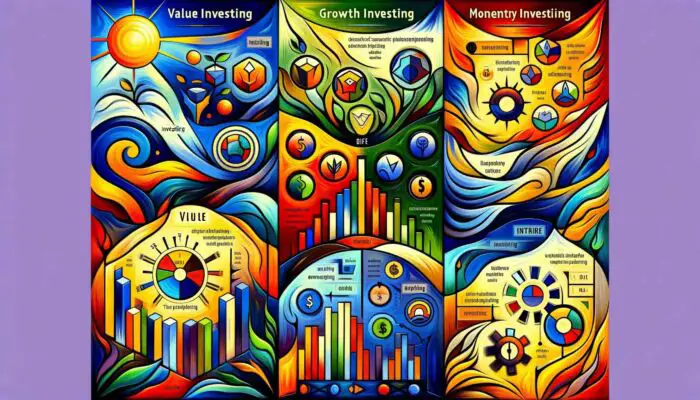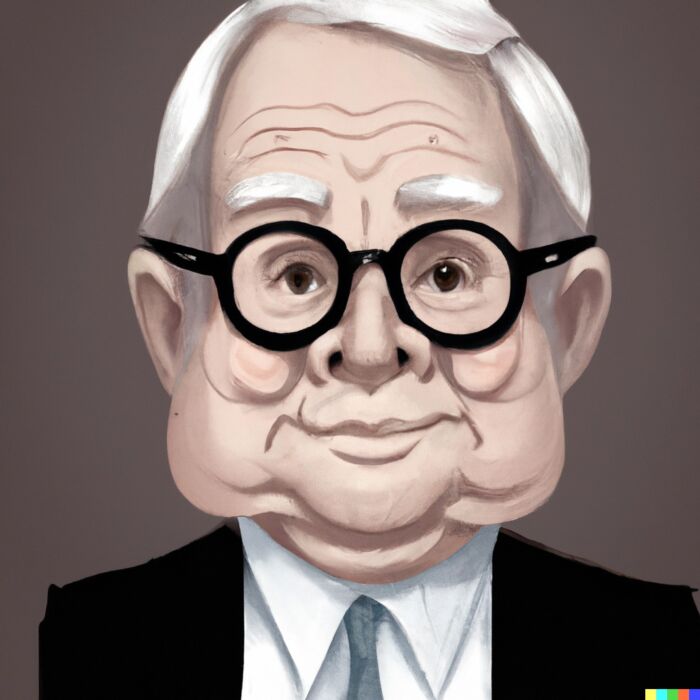Charles T. Munger, better known as Charlie Munger, is not just a name, but a beacon in the world of investing. He has earned his esteemed reputation through his tenacity, financial acumen, and an uncanny knack for picking winners in the investment arena. Munger, the vice chairman of Berkshire Hathaway, the conglomerate steered by his friend and business partner Warren Buffett, has made a tremendous impact on the investment industry with his deep insights and unique philosophy. His career, which has spanned several decades, is filled with enviable investment returns and invaluable nuggets of wisdom.

Explanation of Concentrated Portfolios
When we speak of concentrated portfolios, we refer to an investment approach that contradicts the popular advice of ‘not putting all your eggs in one basket.’ Instead, it’s about purposefully placing your eggs in fewer baskets that you believe have the highest potential and know intimately. Typically, a concentrated portfolio contains a limited number of stocks, often 10 to 15, sometimes even less. This type of investment strategy requires an in-depth understanding of each holding and its potential for growth.
Charlie Munger, a perennial contrarian and advocate of intensive research, believes fervently in the idea of concentrated portfolios. He has often quipped, “Diversification is a protection against ignorance. It makes very little sense for those who know what they’re doing.” His philosophy is built around the idea of investing heavily in businesses you deeply understand and have great confidence in. This article will delve into the reasons behind Munger’s belief in concentrated portfolios and the philosophy that shapes this approach. Get ready to explore the thought process of one of the greatest investment minds of our era.

Background
Charlie Munger’s Early Life and Career

Born in Omaha, Nebraska, in 1924, Charlie Munger displayed early signs of his analytical mind and relentless drive. During his service in the U.S. Army Air Corps as a meteorologist during World War II, Munger took advantage of the G.I. Bill to fund his education at Harvard Law School, where he honed his skills in critical thinking and analysis. His law career, however, would only be a precursor to his ultimate calling: investing.
From practicing law, Munger transitioned into managing investments. He established his investment partnership, Wheeler, Munger, and Company in 1962. While his early career was marked with ups and downs, his determination and analytical acumen soon started yielding success.

His Role in Berkshire Hathaway and His Partnership with Warren Buffett
In the late 1960s, Munger joined forces with his longtime friend, Warren Buffett, at Berkshire Hathaway. Buffett often attributes a significant part of Berkshire Hathaway’s success to Munger’s wisdom, stating that “Charlie shoved me in the direction of not just buying bargains, as Ben Graham had taught me. This was the real impact he had on me. It took a powerful force to move me on from Graham’s limiting view. It was the power of Charlie’s mind.”
At Berkshire Hathaway, Munger and Buffett together championed the cause of value investing and devised an approach that came to be known as the “Berkshire system. They searched for companies with strong fundamental business models, ethical management, and reasonable pricing, then bought significant, often controlling, stakes in them, and held on to those investments for many years, sometimes decades.

Introduction to His Investment Philosophy
Charlie Munger’s investment philosophy revolves around the idea of “rationality. He believes in logical, well-reasoned decision-making, devoid of emotional bias. He advocates for thorough analysis, due diligence, and patience in investing. One of his famous quotes encapsulates this approach: “It’s waiting that helps you as an investor, and a lot of people just can’t stand to wait. If you didn’t get the deferred-gratification gene, you’ve got to work very hard to overcome that.”
One of the most distinct aspects of Munger’s investing philosophy is his belief in concentrated portfolios. He encourages investors to focus their resources on a few companies they understand profoundly. In Munger’s own words, “The idea of excessive diversification is madness.” According to him, a true investor should understand and believe in his investments, and if he does, there’s no need to hide behind the veil of diversification.
This concentration philosophy, a cornerstone of Munger’s investment approach, challenges conventional wisdom and offers intriguing possibilities. It is a journey into the mind of a master investor, a journey that reveals how a deep understanding, patience, and courage to follow one’s conviction can yield extraordinary results.
source: Cooper Academy on YouTube

Understanding Concentrated Portfolios
Explanation of a Concentrated Portfolio
A concentrated portfolio, in simplest terms, is like the strong, brewed espresso of investing, packed with high doses of carefully selected stocks. Instead of spreading investments thinly across a vast range of stocks, a concentrated portfolio holds a smaller number of meticulously picked investments. It embodies the belief that an investor can outperform the market by putting more money into their best ideas.
Typically, a concentrated portfolio consists of 10 to 15 stocks, but can sometimes contain even less. The essence of such a portfolio is not just about the number of stocks but also the amount of research, knowledge, and conviction behind each investment.

The Difference Between Concentrated and Diversified Portfolios
In the vast landscape of investing, concentrated and diversified portfolios represent two contrasting mountain peaks. Diversified portfolios are the embodiment of the popular adage, “Don’t put all your eggs in one basket.” They spread investments across a broad mix of assets, aiming to minimize risk by ensuring that potential losses on one investment are offset by gains on another. It’s a cautious strategy, often preferred by those who value safety over high returns.
Concentrated portfolios, on the other hand, shun the safety of numbers for the promise of higher returns. Instead of spreading risk, they embrace it, focusing on a limited number of investments and banking on the investor’s ability to choose exceptionally well. It’s an approach that requires a lot of knowledge, deep conviction, and an appetite for risk.
Risks and Rewards Associated with Concentrated Portfolios
Walking the path of concentrated portfolios is akin to treading a high wire. The potential for rewards is high, but so is the risk. If your chosen stocks perform well, a concentrated portfolio can provide returns that far outpace the market. It’s the allure of these outsized gains that attract investors to this strategy. Think of it as hunting for treasures; when you find one, it’s much more rewarding than gathering pebbles along the shore.
However, when things go south, they can go south very fast. If one of your selected few stocks fails, it can significantly hurt your portfolio’s overall performance. This approach requires a high degree of conviction and confidence in your investment choices, and even then, the risk of loss remains. But as Charlie Munger would probably tell you, the game of investing isn’t for the faint-hearted. It’s for those who dare to believe in their understanding, research, and intuition, even when the stakes are high.
source: Investor Center on YouTube
Charlie Munger’s Advocacy for Concentrated Portfolios

Munger’s Philosophy and Belief in the ‘Circle of Competence’
Munger’s approach to investing is deeply entwined with his concept of the ‘Circle of Competence. According to Munger, each of us, through our experiences and interests, develops a well of knowledge in certain areas where our understanding is superior to that of the average person. These areas form our ‘Circle of Competence’. Munger believes that by focusing investments within this circle, we can leverage our superior understanding to make better investment decisions.
This philosophy dovetails perfectly into the idea of concentrated portfolios. Instead of scattering resources broadly, Munger advises investors to delve deeply into their areas of competence, and when they find opportunities that they understand profoundly and believe in strongly, to invest significantly.

Munger’s Real-Life Examples of Successful Concentrated Investments
Munger’s advocacy for concentrated portfolios isn’t just theory; it’s backed by a track record of successful concentrated investments. For instance, Berkshire Hathaway’s investment in Coca-Cola, a company whose business model falls well within Buffett and Munger’s Circle of Competence, represents a significant portion of Berkshire’s portfolio and has provided incredible returns over the years.
Another example is Berkshire’s substantial stake in Apple, despite the common perception that technology companies fall outside of their typical investment preference. Yet, Munger and Buffett recognized the immense value in Apple’s strong brand, robust ecosystem, and loyal customer base – factors within their understanding and competence. This bold, concentrated investment has paid off handsomely, further validating Munger’s philosophy.
His Belief in Intensive Research and Deep Understanding of Investments
At the heart of Munger’s belief in concentrated portfolios lies an unwavering commitment to in-depth research and deep understanding. Munger contends that investing isn’t just about crunching numbers; it’s about understanding the business’s intrinsic value, its competitive advantage, its place in the industry, and its future prospects.
This belief is why Munger is known to spend much of his time reading and learning about businesses, industries, and anything else that can help him make better investment decisions. He famously said, “In my whole life, I have known no wise people (over a broad subject matter area) who didn’t read all the time – none, zero.”
For Munger, a concentrated portfolio isn’t a gamble; it’s a calculated, informed decision based on deep knowledge and understanding. It’s about investing significant capital only when you have enough reason to believe that the odds are heavily in your favor.
source: Longboard Asset Management on YouTube

Comparisons to Other Investment Philosophies
Contrasting Munger’s Philosophy with That of Diversification Advocates
Munger’s advocacy for concentrated portfolios stands in stark contrast to the more popular school of thought advocating diversification. Advocates of diversification, like modern portfolio theorists, argue that the most prudent strategy is to spread your investments over a wide array of assets, thereby reducing risk. The underlying logic is that a diversified portfolio can smooth out market fluctuations and provide steady returns.
But Munger would argue that diversification for its own sake could lead to mediocre results. As he put it, “Wide diversification, which necessarily includes investment in mediocre businesses, only guarantees ordinary results.” In his view, having a deep understanding of a few excellent businesses can lead to superior outcomes than spreading bets across numerous average ones.
Why Different Investment Styles Work for Different Investors
Different investment styles work for different people, and there isn’t a one-size-fits-all strategy. A passive investor might prefer diversification to mitigate risk and achieve steady returns, while an active investor with deep knowledge about specific industries might lean towards a concentrated portfolio to exploit their edge.
The key to choosing the right strategy lies in understanding one’s investment goals, risk tolerance, and level of expertise. An investor who is comfortable taking on more risk for potentially higher returns and has a strong understanding of certain companies or industries might be more drawn to a concentrated investment approach.

Criticisms and Limitations of Concentrated Portfolios
Despite Munger’s success, it’s important to note that concentrated portfolios are not without their criticisms and limitations. The biggest criticism is the inherent risk involved – a few bad bets can significantly impact the portfolio’s overall performance.
Furthermore, this approach requires a high degree of expertise, an in-depth understanding of each holding, and the time and resources to conduct thorough research. Not all investors have these resources or the appetite for the risk that this strategy entails.
Also, the concentrated portfolio approach is often criticized for its potential to lack diversification, which could lead to higher volatility. It is inherently a less stable strategy, more vulnerable to market fluctuations than a diversified approach.
In essence, while the rewards of a concentrated portfolio can be high, the approach is not without its downsides. It requires a level of commitment, knowledge, and risk-taking that might not suit every investor’s style or temperament. As with most things in life, it’s about balancing the potential for high rewards with the inherent risks and understanding what fits best with one’s own circumstances, temperament, and investing philosophy.
source: Investor Center on YouTube
Lessons from Charlie Munger’s Philosophy

The Value of Deep Knowledge in Investment Decisions
The first and perhaps most significant lesson from Munger’s philosophy is the high regard he places on deep knowledge. Munger underscores that in-depth knowledge about a company, its industry, and its competitors is more valuable than any statistical data or financial algorithm.
In Munger’s world, successful investing isn’t just about having access to the right information; it’s about understanding that information, discerning patterns, identifying long-term trends, and making educated judgments. He advocates for ‘learning machines,’ investors who are continually expanding their ‘Circle of Competence’ by voraciously reading and learning.
So, whether you decide to concentrate your portfolio or diversify it, the key takeaway is clear: deep, insightful knowledge is the cornerstone of any successful investment decision.

The Importance of Patience and Long-Term Investment
If there’s one thing that Munger has demonstrated time and again, it’s that patience is an investor’s best friend. In a world that’s increasingly focused on quick profits and short-term gains, Munger’s emphasis on long-term investing is a refreshing reminder of the power of compound interest.
This philosophy doesn’t just apply to concentrated portfolios; it’s a lesson for all investors. Patience allows investments the time they need to grow, and it prevents rash decisions based on temporary market fluctuations. As Munger often says, “The big money is not in the buying or selling, but in the waiting.”
Need for Risk Tolerance and Emotional Stability in Concentrated Investing
Lastly, Munger’s philosophy underscores the need for both risk tolerance and emotional stability in investing, especially when it comes to concentrated portfolios. Concentrated investing isn’t for the faint-hearted. It requires the courage to put a significant portion of your capital into a few selected stocks, the patience to wait for your investment thesis to play out, and the emotional stability to not panic when things go south.
Munger’s strategy teaches us that managing our emotions and maintaining a long-term perspective can be as important, if not more so, as our analytical skills in the investing world. So, regardless of whether we follow a concentrated or diversified investment strategy, cultivating emotional resilience and risk tolerance is essential to navigating the often turbulent waters of the investment world.

Recent Trends and Observations
Changes in the Investment World and Their Impact on Concentrated Investing
The investment landscape has changed significantly since Munger began his investing journey, with the advent of high-frequency trading, complex financial instruments, and sophisticated algorithms. These changes have made the market more efficient, which some argue makes it more challenging to find undervalued stocks – a cornerstone of Munger’s philosophy.
However, even in this rapidly changing environment, the principles underlying Munger’s concentrated portfolio approach remain relevant. The rise in the number of available investment options has made it even more crucial for investors to have a deep understanding of their investments, reinforcing the value of the ‘Circle of Competence’.
How New Technologies and Information Accessibility Affect Munger’s Philosophy
Today, information is more accessible than ever, and new technologies have made it easier to analyze this information. However, this doesn’t necessarily contradict Munger’s philosophy; in fact, it may even bolster it. With more data and analysis tools at our fingertips, investors who are willing to do the legwork can gain a deep understanding of their investments, aligning with Munger’s emphasis on knowledge and understanding.
Yet, the abundance of information can also lead to ‘information overload’, where the sheer volume of data leads to poor decision-making. Munger’s focus on maintaining a narrow ‘Circle of Competence’ can help investors cut through the noise and focus on what’s important.

Contemporary Investors Following Munger’s Concentrated Portfolio Approach
Several successful contemporary investors have adopted Munger’s concentrated portfolio approach. Notable among them is Bill Ackman, founder of Pershing Square Capital Management. Ackman is known for making large, concentrated bets on companies he has thoroughly researched and strongly believes in, much like Munger.
Similarly, Mohnish Pabrai, a prominent value investor and a self-proclaimed disciple of both Buffett and Munger, holds a highly concentrated portfolio. He argues that “diversification makes very little sense for those who know what they are doing.”
These investors and many others show that while the investing world has evolved, the principles underlying Munger’s philosophy – deep understanding, patience, and the courage to make significant bets on a few select stocks – remain not just relevant, but can lead to substantial success in today’s investment landscape.

Conclusion: Munger’s Philosophy and Its Implications
Charlie Munger’s philosophy centers on the idea of concentrated investing, where investors put a substantial portion of their capital into a handful of stocks that they understand profoundly and believe in strongly. This approach is deeply intertwined with Munger’s concept of the ‘Circle of Competence’, emphasizing the value of deep knowledge in investment decisions.
This philosophy underscores the importance of patience, long-term investing, and emotional resilience in the face of market turbulence. It reminds us that successful investing is not about chasing the latest trends, but about deep understanding, conviction, and the courage to make significant bets when the odds are heavily in our favor.

Reflection on the Viability of Concentrated Portfolios in Today’s Investment Landscape
Today’s investment landscape, marked by easy access to information, advanced technologies, and a wide array of investment options, presents both opportunities and challenges for concentrated investing. While these changes can make the market more efficient and make it harder to find undervalued stocks, they also reinforce the importance of having a deep understanding of our investments.
As investors, we can leverage these new technologies and the wealth of information to gain a deep understanding of our chosen investments. However, we must also guard against ‘information overload’ and maintain our focus on our ‘Circle of Competence’, just as Munger advises.
Final Thoughts on Charlie Munger’s Approach to Investing in Concentrated Portfolios
Munger’s approach to concentrated investing serves as a valuable lesson to all investors, regardless of whether we choose to concentrate our portfolios or diversify them. It teaches us that investing isn’t just about numbers; it’s about understanding businesses, making educated judgments, and having the courage to act on our convictions.
While concentrated portfolios come with higher risks, they also offer the potential for higher returns for those who dare to embrace them. The key is to find the right balance between the potential for high rewards and the inherent risks, and to make decisions that best align with our investment goals, risk tolerance, and areas of competence.
Above all, Munger’s philosophy is a testament to the power of lifelong learning, deep understanding, and the boldness to bet heavily when the odds are in our favor. And these are lessons that can benefit us all, whether we choose to follow a concentrated or diversified investment strategy.
Important Information
Investment Disclaimer: The content provided here is for informational purposes only and does not constitute financial, investment, tax or professional advice. Investments carry risks and are not guaranteed; errors in data may occur. Past performance, including backtest results, does not guarantee future outcomes. Please note that indexes are benchmarks and not directly investable. All examples are purely hypothetical. Do your own due diligence. You should conduct your own research and consult a professional advisor before making investment decisions.
“Picture Perfect Portfolios” does not endorse or guarantee the accuracy of the information in this post and is not responsible for any financial losses or damages incurred from relying on this information. Investing involves the risk of loss and is not suitable for all investors. When it comes to capital efficiency, using leverage (or leveraged products) in investing amplifies both potential gains and losses, making it possible to lose more than your initial investment. It involves higher risk and costs, including possible margin calls and interest expenses, which can adversely affect your financial condition. The views and opinions expressed in this post are solely those of the author and do not necessarily reflect the official policy or position of anyone else. You can read my complete disclaimer here.






